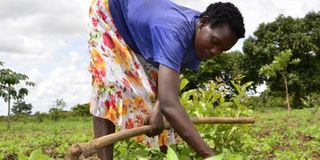Agriculture is an essential part of the curriculum

A woman in her garden in Aromo Sub country, Lira District. PHOTO BY RACHEL MABALA
What you need to know:
- Feeding the world is a job that isn’t ever going to become obsolete, and it will always need more youth with innovative minds to join.
- Exposing the youth to these opportunities at O-Level will motivate them to select career pathways that contribute to the country’s economic backbone.
Agriculture still forms the backbone of Uganda’s economy contributing approximately 37 per cent (PWC 2013) of the Gross Domestic Product (GDP). It provides employment opportunities to many people. It produces exportable items, which increases the foreign exchange resources. So, the agricultural sector is helpful to make rapid economic development.
Agriculture subject is an elective in secondary schools. This means that a student can choose to add it to the eight compulsory subjects at Ordinary Level. The proposed move by National Curriculum Development Centre (NCDC) to scrap agriculture in secondary schools is not a good idea.
The topics taught in Agriculture are essential to students in many ways. A substantial number of youth do not get the opportunity to continue in the formal education system beyond this level. Gaining in-depth knowledge in agriculture provides them with interest to venture into agricultural enterprises as a source of income.
Schools should be encouraged to have garden/animal rearing projects that provide hands-on experience to compliment that theoretical class sessions. These experiences are what we had privilege to benefit from. Each class had a micro-farm and the best could be awarded after harvest. The returns from the project could be used to run some of the school garden’s day-to-day activities and to reward the participating students. Through such initiatives, students learned the value of agriculture as a business and some would transfer the knowledge to improve the agricultural project carried by their parents and other family members.
At secondary school level, young people are at a suitable stage where they decide their career path. Our introduction to Agriculture during O-Level piqued our interest to pursue career paths that would contribute to improving agricultural development in Uganda. Knowing that we can contribute to feeding the ever increasing population and to improving the economic status of the rural populace was great motivation.
Feeding the world is a job that isn’t ever going to become obsolete, and it will always need more youth with innovative minds to join. There are a number of agricultural-related career options starting with research for products/technologies development all the way to value-addition and marketing.
Exposing the youth to these opportunities at O-Level will motivate them to select career pathways that contribute to the country’s economic backbone.
Owen Singura is a Biotechnology graduate and Dr Mugwanya is a senior scientist with NARO.




